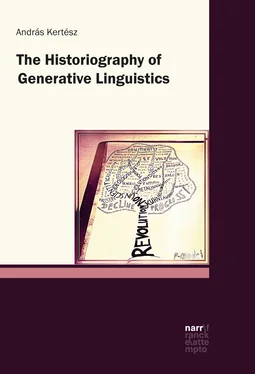Second, LakoffLakoff, Robin does not dispute that it is possible to imitate natural sciencesciencenaturals via formalizing, quantifying and the application of discrete categories. Nevertheless, the findings will be different from those of the natural sciences (Lakoff 1989: 965). She makes a distinction between ›doing science‹ and ›playing science‹, where the latter imitates the former; and she places ChomskyChomsky, Noam’s approach in the latter category. If linguists mistakenly assume that they ›do science‹ while in reality they ›play science‹, then they run the risk of applying the surface manifestations of scientificscientific behavior for their own sake. For instance, quantifying, formalizing, and replicating the findings, etc. may convey the impression that one is a responsible, real scientist – whereas, in reality, this is not so (Lakoff 1989: 965, footnote 8). Furthermore:
It also may be germane to note that the paradigmparadigm ›science‹ socialsocial scientists like linguists are prone to take as a model is Newtonian physicsphysics, with its dichotomies, objectivity, and certaintycertainty. But quantum physics has cast doubt on all these vaunted desiderata, and we might ponder the dubious advantages of modeling our own theorytheory and method on those of an obsolescent field (LakoffLakoff, Robin 1989: 966, footnote 8, emphasis added).
Third, the variety and complexity of linguistic datadata is not compatible with an adherence to the exclusive use of the formalformal methods represented in Aspects Aspects (LakoffLakoff, Robin 1989: 595–596):
To abjure non-discrete theories because they are unsettling, or because they conflict with the kinds of formalism we currently feel comfortable with, is antiscientific in the most dangerous way : analogous to the Church’s determination that Galileo’s claims were heretical because they were antithetical to current established wisdom (LakoffLakoff, Robin 1989: 956, footnote 5, emphasis added).
Finally, in accord with this observation and in stark contrast with the vulgarized linguistic application of KuhnKuhn, Thomas S.’s approach, she rejects the exclusive attitude of ChomskyChomsky, Noam’s group. She believes that the pluralismpluralism of linguistics stemming from the constitutive properties of datadata is valuable and contributes to a fuller and more precise understanding of the object of investigation:
We have tried for most of this century to force languagelanguage into the Procrustean bed of ›science‹, and the chaos and dissension that we have experienced in the field are the result. If we are a science, we must assume that only one paradigmparadigm has access to the truth, and it had better be our own. But the impossibility of getting everyone in the field to accept a single paradigm, to settle down to KuhnianKuhnian ›normal sciencesciencenormal‹, demonstrates that we have been seeing things incorrectly. […] each linguist, or each theoretical perspective, captures a different vision of the linguistic reality, and all, though incompatible as scientificscientific theories, have something to add to our knowledge. But we can no longer require that perspectives be combinable into one single theorytheory: We must settle for different, but equally valid, viewpoints (LakoffLakoff, Robin 1989: 985–986, emphasis added).3
In connection with (14)(b), LakoffLakoff, Robin uses religious metaphors when describing the generative group of the end of the 1950s and the beginning of the 1960s, a group whose members had been forged by the war against a common enemy (»us against the world«, Lakoff 1989: 963). This bond that united the community broke up because the war against the neo-Bloomfieldianneo-Bloomfieldians was over and there was no enemy to defy anymore. This allowed the conflicts between different personalities inside the group to come to the surface.
Another reason why the war between generative semanticssemanticsgenerative and the Chomskyan approach started, according to Robin LakoffLakoff, Robin, is that two kinds of people were present in the group (Lakoff 1989: 944–946). The members of the first kind tended to think formally, using discrete terms; they were, by temperament, logicians or mathematicians. The other kind of personality followed humanist values: »to them being human entailed more than manipulating formalformal structures« (Lakoff 1989: 945). These two types got along well as long as they were forged together against the neo-Bloomfieldianneo-Bloomfieldians, whom they had declared their common enemy. However, this war had ended with the victory of the Chomskyan group by the time Aspects Aspects was published (Lakoff 1989: 968). At that time, although both kinds of personalities thought they would proceed with their research in accord with Aspects , the community split into two groups (Lakoff, 1989: 946). The split was rooted in the vagueness of ChomskyChomsky, Noam’s work (and within this, of Aspects as well), which led the members of the group to develop the principles of Aspects along different lines, according to their own distinct personalities. According to Lakoff, this vagueness, on the one hand, left the way open to different interpretations as »a brilliant theoretical stroke« (Lakoff 1989: 944), thereby reducing the strength of counterarguments, and on the other hand, it also prevented conflicts within the group. One kind of personality emphasized the use of discrete terms and found it important to disregard datadata contradicting generalizations, to maintain an abstract system, which is partly independent of data, and to refine formalism. The other attempted to tailor the theoretical apparatus to the variety and complexity of data. The two types of theoretical habits originating from these distinct personalities were closely related to the structure of the groups. Whereas formal thinking requires an autocratic and hierarchical organization, humanist personalities accept equality and the pluralismpluralism of ideas. Lakoff demonstrates vividly the autocratic system that Chomsky established around himself and the increasing antipathy with which generative semanticists rejected not only Chomsky’s views but also his personality, as a result of which »once Chomsky was seen not to be an idol, he was recast as satanic, the Enemy« (Lakoff 1989: 970).
The conflict that arose between the two groups by virtue of the distinct interpretations of deep structure in Aspects Aspects »was not a theorytheory-internal conflict, such as can be resolved in terms of a KuhnianKuhnian paradigmparadigm shift« (LakoffLakoff, Robin 1989: 946). Therefore, Aspects cannot be considered to be revolutionaryrevolutionary, and generative semanticssemanticsgenerative was not a counter-revolution against it – it is simply the case that the historyhistory of generative linguistics, both before and after Aspects , cannot be evaluated in terms of the Kuhnian framework. The victory of Aspects can be viewed as a declinedecline in the sense that it is not the result of scientificscientific quality, but that of a claim to power, discrimination and personalities.
We reconstruct Robin LakoffLakoff, Robin’s answer to the question in (P) as the following:
| (SP14) |
The basic terms of the historiographyhistoriography of generative linguistics with respect to Aspects Aspects are ›scientificscientific method‹ and ›personality‹ as the determinants of the theory’theorys content, its central hypothesis is (T14), and its framework is memoir complemented by metatheoreticalmetatheoretical reflection. |
2.3 ›The Sound Pattern of English‹ (ChomskyChomsky, Noam & HalleHalle, Morris 1968)
2.3.0 Background information
Читать дальше












